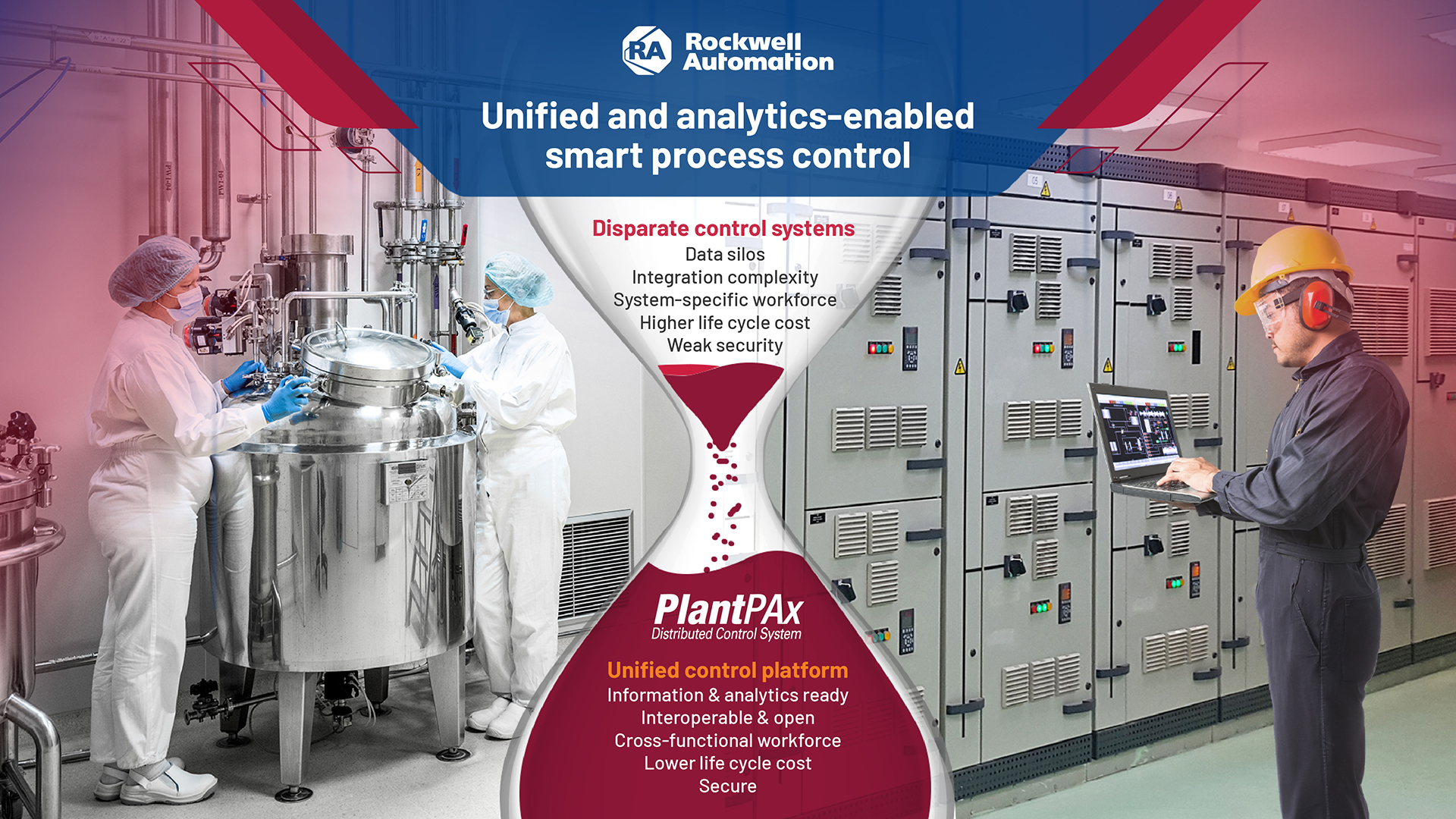

Transforming Modern Industry: Unified Process and Power Control with Advanced Analytics for Future-Ready Operations
Unify process & power control for optimized manufacturing. Rockwell Automation’s PlantPAx® DCS integrates process automation, power control, and analytics, enhancing efficiency, reducing costs, and accelerating digital transformation. Discover how a modern DCS drives productivity & sustainability.

In today's competitive industrial landscape, manufacturers are constantly seeking ways to balance productivity against budget and resource constraints, while proactively addressing evolving operational risks. Organizations are thus seeking to create efficiencies and are finding new ways to control costs, with manufacturing costs being an important part of this effort. One such opportunity that can bring visible and clear gains for the said effort is a unification of disparate systems.
Traditionally, subsystems like process automation, motor control, power control, networks, and security are isolated, right from design, bid, and execution of a project, to operation and maintenance during the entire lifecycle, often leading to not only increased design & operational cost, but also a bottleneck in digital transformation journey due to lack of data.
The cost of disparate systems:
Disparate systems such as separate process control and power control/motor control results in:
Poor visibility and data sharing between subsystems and no single source of truth for analytics. Due to silos created between these sub-systems, data is locked in various places and can’t be visualized or analyzed to make timely and critical decisions.
Interfacing complexity causes project overrun and operational risk. Systems designed in isolation and interfaced during commissioning suffer an extremely high risk of startup delays and associated cost overruns. This also contributes to the limited data availability.
Challenges to find a workforce with multiple skill sets. The teams managing these areas are separate and this not only adds to the siloed approach but also limits the organization’s ability to optimize resources and workforce without affecting operations.
Increased cost and time during the entire lifecycle of plant operations. Once in production, systems that rely on custom interfaces, gateways, and middleware suffer ongoing data access limitations, scalability, maintenance, and troubleshooting issues.
To address these challenges and establish a truly connected enterprise, manufacturers need a Modern process control technology that delivers smart plant-wide control.
Benefits of a Unified Control Platform
Reduce risk and cost with one architecture designed for interoperability and connectivity. A unified system with a unified procurement and execution contract greatly simplifies and de-risks the project and typically saves 15-25% vs disparate systems. Reduction in interface points, a number of vendors, hardware parts, and software licenses bring in economies of scale.
Improve productivity through simplification & standardization. Unified systems utilize common device management and configuration tools. Alarms with common timestamping is helpful in understanding the sequence of events during a fault and troubleshooting faster.
Optimized and enabled workforce: One view of your plant with visibility to insightful data, enabling more efficient and effective decision-making. This helps optimize and retain the workforce, due to no strict separation of workforce by subsystems in a plant.
Enable energy and Process analytics to optimize WAGES consumption and automate reporting.
Rockwell Automation's PlantPAx® distributed control system (DCS) offers a modern approach to integrating processes with power & analytics. This system is designed to overcome the limitations of traditional process control systems, providing a unified platform that seamlessly integrates with other automation systems. By adopting plant-wide control technology, manufacturers can achieve significant improvements in productivity, efficiency, and cost savings.
Rockwell Automation has curated vast libraries across the process applications – this means integrating IO, Instrumentation, Power, and Motor devices is all native, Low Code/No Code.
Rockwell has also developed smart process objects for third-party intelligent power devices such as Protection Relays and Digital Trip Units. This is achieved with a native 61850 adapter for our next gen smart process controller. This gives consistent multi-vendor support of Intelligent Electrical Devices
PlantPAx analytics enables the data generated from devices to be contextualized with the help of the industrial data ops platform and presented in form of insights for faster decision-making. Some of the noteworthy analytics applications are Energy Management, Batch management, and Asset management.
With these Process, Electrical, and communication foundations, Unified modern process control with PlantPAx enables higher-level Analytics, Process Optimization, Enterprise Visualization, MES, MOM, and ERP seamlessly as the next steps aiding in the digital transformation journey
Case Studies on Modern Process Control
A leading pharmaceutical company wanted to reduce its time to market with faster engineering and commissioning time along with better visualization and compliance to 21 CFR Part 11. With seamless power and process integration of PlantPAx, it achieved a reduction in commissioning time and compliance with regulations too.
A green hydrogen manufacturing company was able to get valuable data from the process and power side of the plant to optimize the plant operations. It could accelerate speed to market and reduce the total cost of ownership with open and flexible control system technology. Yet another example, of how PlantPAx DCS with its integrated power and process control, scalability, openness, and flexibility can help new industries start quickly even when less historical data about these processes is available, contributing to a more sustainable and greener world.
Many process plants have outdated DCS systems currently in place. As DCS reaches the end of its life, it is inevitable that questions about part-sourcing, service, potential productivity losses from old technology, and increased risks of downtime, become more likely.
For manufacturers considering the transition to a modern DCS, Rockwell Automation offers comprehensive migration solutions. These solutions encompass many legacy DCS systems and include tools that ease migration, such as I/O scanners, wiring harnesses, and database conversion. By incorporating newer technologies at a comfortable pace, manufacturers can gradually upgrade their control systems without disrupting operations.
Conclusion
The integration of process and power functions with analytics through a unified control platform offers numerous benefits for manufacturers. By adopting a modern DCS like the PlantPAx® system, manufacturers can achieve increased efficiency, reduced risk, greater visibility, cost savings, and enhanced productivity. As the industrial landscape continues to evolve, the trend towards integrated control systems is set to play a crucial role in driving operational excellence and competitiveness.
Learn more on how Rockwell Automation's PlantPAx® system can help your organization achieve plant-wide optimization here

About the Author: Ankur Pancholi, Business Manager, Software and Control, Rockwell Automation India is a dynamic leader with over 25 years’ of experience in automation and manufacturing, specializing in Chemical, Pharmaceutical, Discrete, and Process Automation. He is passionate about creating a future-ready manufacturing industry in India, through cutting-edge automation technologies.